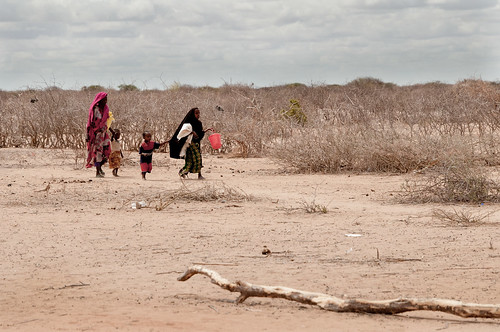 |
| Flickr/Colin Crowley, Save the Children. |
Gartenstein-Ross directs the Center for the Study of Terrorist Radicalization at the Foundation for Defense of Democracies. Vassefi is a faculty member at the Naval Postgraduate School.
Here's the first quote:
The southern parts of Somalia are the drought crisis's "ground zero," as David Shinn, the U.S.'s former ambassador to Ethiopia, put it in an interview with us. This creates a perplexing dynamic, since the dominant force in the drought-stricken areas of Somalia is al Shabaab, the extremist, al Qaeda-linked militia that many U.S. policymakers see as the region's most significant strategic challenge. This drought thus presents challenges for Shabaab itself, but also for the United States.And here's the second:
Ambassador Shinn treated Shabaab's invitation to have NGOs apply for re-entry with some skepticism. "The devil is in the details," he said. "What will they require? They'll certainly insist that anyone who moves food does so with truckers who are part of Shabaab, or contribute to Shabaab's coffers. They'll want to make money on this."
Shabaab's propensity to extract economic gain from relief agencies also presents a challenge for U.S. policy. The U.S. has pledged $5 million to assist Somalis who have been struck by this drought. But, at the same time, U.S. policy is designed to prevent money from flowing to organizations like Shabaab, which has been named a Specially Designated Global Terrorist entity by the U.S. Treasury Department. Humanitarian organizations that provide money to such groups can face legal repercussions, even if it's extracted from them unwillingly as a "tax."
These two competing desires -- to help the Somali people, and to prevent money from reaching militant groups -- sets up a real dilemma for American policymakers. "The U.S. has been a leader in saying we won't put up with money going to Shabaab," Ambassador Shinn said, "but it creates a drastic humanitarian issue. Do you cut off food aid to a region because it will be indirectly funding a terrorist organization? Some humanitarians say you just have to hold your nose and do it, others say no."



